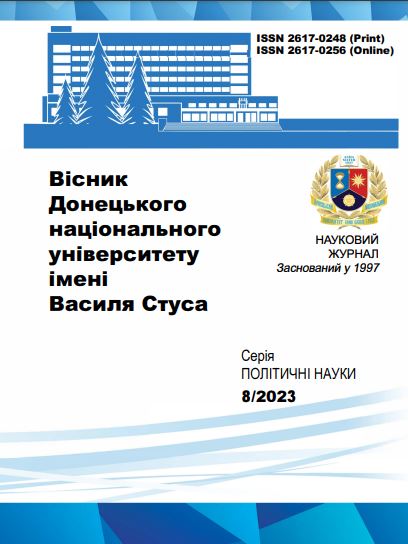Memory politics as a resource of symbolic politics
DOI:
https://doi.org/10.31558/2617-0248.2023.8.10Keywords:
politics of memory; symbolic politics; myth-making; collective identity; historical narrative; public commemorationAbstract
The article examines the relationship between the politics of memory and symbolic politics, taking into account such important components as historical politics, political use of the past, mythmaking, collective identity, historical narrative, public commemoration. Accordingly, the interpretation of the specified components is proposed. Historical politics is a segment of the politics of memory, which means the interpretation of history chosen for political (party) motives, and attempts to convince the public of the correctness of such an interpretation with the aim of establishing certain ideas about the collective past and forming the appropriate cultural infrastructure, educational policy, and legislative regulation. Political use of the past is an appeal to history in a political context, regardless of whether it forms a coherent strategy. Myth-making is the construction or reproduction of already existing myths, which are necessary for the consolidation of the community and civil harmony in relation to significant ideas and relevant decisions carried out by the ruling elites and the state. Collective identity is a type of social consolidation that combines attachment to a certain territory, shared historical memories, myths, and traditions. A historical narrative is a plot-framed story that offers a complete picture of history, composed of events-fragments that can be unfolded into independent plot narratives. Public commemoration is a set of public acts of recalling, understanding, and reinterpreting historical figures, events, and images of the past in the modern context.
On this basis, the process of constructing collective and political identities using the resources of history is revealed. It has been argued that the politics of memory needs support in the form of symbols, as they anchor memories for the future and provide a certain social integrity for future generations. The politics of memory is defined as a set of public interactions of political forces interested in a particular understanding of the past. It is noted that the hegemony of certain versions of the memory of the ancient or recent past is a dynamic result of the interaction (competition or convergence) of different narratives. The understanding of symbolic politics is affirmed as the interaction of a wide range of actors who promote various interpretations of social reality that can compete, combine or support each other. It was found that the struggle in the modern world is not reduced to a traditional ideological struggle. In the field of symbolic politics, there are specific mechanisms, the study of which makes it possible to better understand why some ways of interpreting social reality are more influential than others, what determines success, and what resources work more efficiently.
References
Подольський А. Сучасна історія як інструмент політичних маніпуляцій (на прикладі вивчення історії Голокосту). Наукові записки Інституту політичних і етнонаціональних досліджень ім. І. Ф. Кураса НАН України. 2017. Вип. 4. С. 205–212.
Rousso H. The History of Memory: Brief Reflections on an Overloaded Field. Clashes in European Memory: The Case of Communist Repression and the Holocaust / Eds. M. Blaive, C. Gerbel, and T. Lindenberger. Innsbruck : Studienverlag, 2011. Р. 92–145.
Megill A. Historical Knowledge, Historical Error: A Contemporary Guide to Practice. Chicago : University of Chicago Press, 2007. 288 р.
Ліщинська О. І. Образ сучасного героя: репрезентації в царині українського актуального мистецтва. Актуальні проблеми філософії та соціології: науково-практичний журнал / Голов. ред. Д. В. Яковлев; відпов. секретар І. В. Шамша; Міністерство освіти і науки України; Національний університет «Одеська юридична академія». Одеса, 2017. Вип. 20. С. 59–62.
Callahan W. A. History, Identity and Security: Producing and Consuming Nationalism in China. Critical Asian Studies. 2006. Vol. 38. No. 2. Р. 179–208.
Bell D. Introduction: Memory, Trauma and World Politics. Memory, Trauma and World Politics: Reflections on the Relationship between Past and Present / Ed. D. Bell. New York : Palgrave, 2006. Р. 1–39.
Smith A. National Identity. London : Penguin, 1991. P. 9–14.
Eder K., Spohn W. Collective Memory and European Identity: the Effects of Integration and Enlargement. Aldershot : Ashgate, 2005. 240 р.
Olick J. K., Vinitzky-Seroussi V., Levy D. The Collective Memory Reader. New York : Oxford University Press, 2011. 497 р.
Gong G.W. Memory and History in East and Southeast Asia. Washington : The CSIS Press, 2001. 228 р.
Topolski J. The Role of Logic and Aesthetic in Constructing Narrative Wholes in Historiography. History and Theory. 1999. Vol. 38. N 2. P. 198–210.
The Art of Commemoration: Fifty years after the Warsaw Uprising / ed. by Titus Ensink, Christoph Sauer. Amsterdam etc. : John Benjamins Publishing Company, 2003. 258 p.
Kertzer D. I. Ritual, Politics, and Power. New Haven etc.: Yale University Press, 1988. 235 p.
Wodak R., De Cillia R. Commemorating the past: The discursive construction of official narratives about 'Rebirth of Second Austrian Republic. Discourse & Communication. 2007. Vol. 1, N 3. Р. 337–363.

